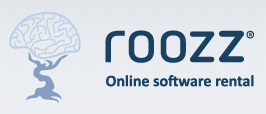Cloud services have been entering the mainstream, especially in the enterprise, for a while now, and even major players are dabbling with converting what was traditional “product software” into “services”. Take Xbox 360 now offering pay-as-you-go Karaoke or Adobe experimenting with rental models. Seattle-based Spoon.net, which develops application virtualization software technology, does just this, and recently added support for Windows 8. They overall idea is that users can convert existing EXE applications into web apps. Now Danish company Roozz, which allows software publishers to make their titles available for rental as a cloud service, says it has gone from 500,000 to 1 million downloads of its proprietary browser plugin which let’s users access normally desk-bound software via a browser.
Examples of this working include the DVD-burning application “ConvertXtoDVD” which runs on Roozz because users apparently prefer to rent the service on an ad-hoce basis rather than pay the full price for the software. Apparently even media applications like photo editing and DVD burning software can now run in the browser this way, instead of on a remote server. Publishers may well end up making more money this way in the long term, Roozs currently has 100 desktop software titles on the service.
Current Software on Roozz now include well-known sound editor Audacity, and lots of lesser known iittle Windows software. Users currently have access to more than 100 desktop software titles from varying publishers without having to install and pay the full license price.
Founded in 2010 and is based in Copenhagen, Denmark, Roozz received seed venture funding late 2011 with local firm seedcapital.dk as a lead investor.
Thomas Jam Pedersen, CEO of Roozz.com says they started this company out of frustration and the desire to use quality software, and managed to strike a chord.
Now, it may not be a “beast” of a market but it is interesting to see this model emerge and engage with traditional software publishers.
Certainly the model is cheaper for the occasional user which has a wide user base. Consumers also don’t have to install software or manage license keys.
Hulu or Spotify for software anyone? One slight drawback – no Mac apps as yet.
